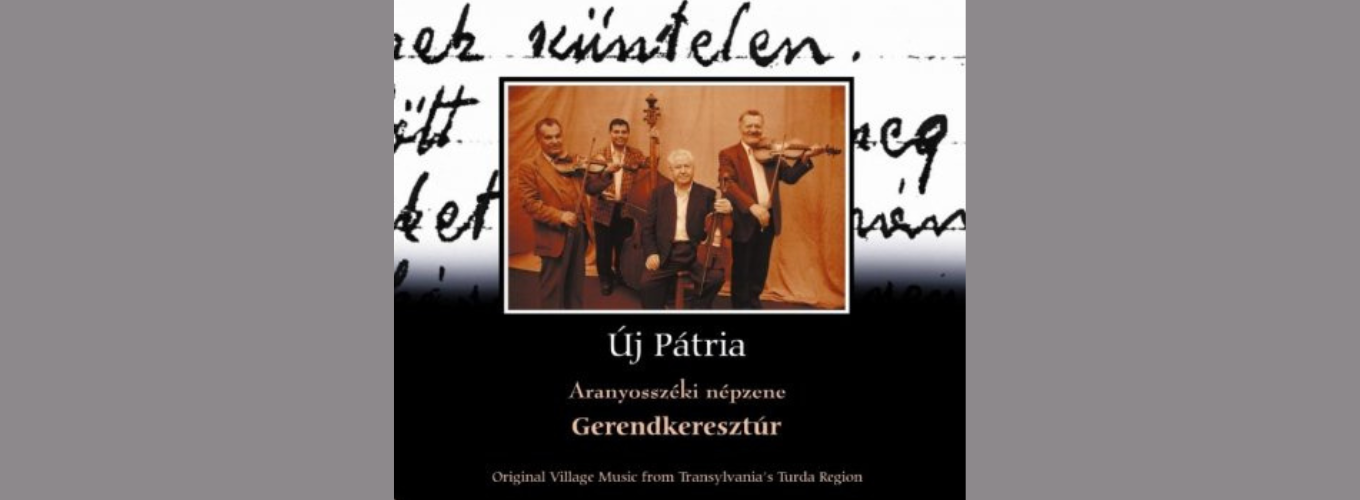
Gerendkeresztúr - Original Village Music from Transylvania’s Turda Region - New Patria series
Various names are used to refer to the local dances. The men’s solo dance played with a quick dűvő accompaniment (two quarter notes with marked stress on both, produced with one stroke of the bow) is known as verbunk, csűrdöngölő and ungureşte de ponturi or româneşte de ponturi. Either a turning couple dance or quick men’s solo dance are done to the tune called serény. These tunes are remnants of archaic couple dance melodies from before the appearance of the “new style” couple dance, the csárdás.
As heard on these recordings, the same melody is used here in different functions; so, when going from the verbunk into the serény, the tempo slows down, but the melody remains the same. The csárdás is called pe doi paşi or ţigăneşte by local Romanians; the Gypsies call it ţigăneşte. There is ample use of transitional phrases between the melodies; they are heard during the men’s dance tunes, as well as in the couple dance tunes (e.g. serény, korcsos, învârtita, etc.).
1. Román katonakísérő (Romanian soldier’s tune) 2’10”
2. Magyar pár: verbunk, serény, csárdás, korcsos és szökő (Hungarian dance cycle) 10’53”
3. Megöltek egy legényt... (ballada) (Hungarian ballad) 3’12”
4. Román ponturi és magyar legényes (Romanian and Hungarian men’s dances) 6’19”
5. Hore a oilor (Juhait kereső pásztor) (The shepherd lost his sheep) 2’35”
6. Zili és ţigăneşte (Gypsy tune and dance) 2’01”
7. Ţigăneşte és csingerálás (Gypsy dances) 4’25”
8. Búra, búra, búbánatra születtem... (Hungarian song) 1’30”
9. Román kolinda (Romanian Christmas carol) 1’30”
10. Román pár: purtata, învârtita, pe doi paşi és hârţag (Romanian dance cycle) 5’20”
11. De chiuit és jocul miresii (Romanian wedding music) 3’08”
12. Násznagy hazakísérő nótája (Hungarian wedding music) 1’36”
13. Román halottkísérő (Romanian funeral processional) 2’49”
14. Mikor mentem a faluból kifelé... (Hungarian song) 2’11”
15. Cigány katonanóták (Gypsy soldier’s tunes) 2’09”
16. Székelyverbunk (Men’s recruiting dance) 3’24”
17. Magyar pár: verbunk, serény, csárdás, korcsos és szökő (Hungarian dance cycle) 12’23”
Összidő (Total time) 68’27”
ADATKÖZLŐK / PERFORMERS – INFORMANTS
VOIVOD János (1932, Gerendkeresztúr) – hegedű / violin
VOIVOD Ödön (1934, Gerendkeresztúr) – hegedű / violin
MURŞA Vasile (1933, Marosludas) – kontra / 3-stringed viola
MURŞA Ioan (1962, Marosludas) – nagybőgő / double bass
ANTAL Árpádné ZILAHI Rozália (1937, Gerendkeresztúr) – ének / voice